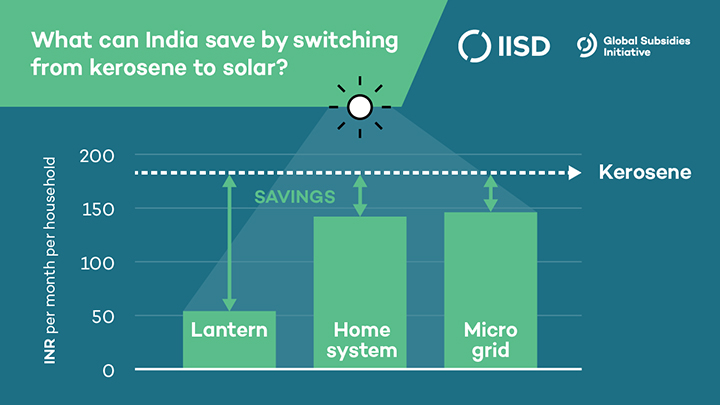Switching kerosene subsidies to solar would cost India less, reduce indoor pollution: Report
India could save money and reduce indoor air pollution by switching kerosene subsidies to solar.
Off-grid solar enjoys widespread public support, surveys find
New Delhi (April 18, 2019) – India has almost achieved the historic goal of connecting every household to the electricity grid. The next challenge is 24x7 Power for All. According to a new independent study by the International Institute for Sustainable Development (IISD) and The Energy and Resources Institute (TERI), switching subsidies from kerosene to off-grid solar products would improve electricity access for households still reliant on kerosene.
Despite the success of SAUBHAGYA, millions of households continue to use kerosene lamps during outages or because they cannot afford electricity. But kerosene is problematic because it provides poor-quality light, causes harmful indoor air pollution and is a fire risk. The report shows support for off-grid solar could be made directly to households, through manufacturers or as subsidized credit through financial institutions.
Balasubramanian Viswanathan, IISD Associate and co-author of the study says, “Over the lifetime of the products, solar lanterns, home systems and microgrids are all cheaper than the combined household and government expenditure on kerosene. The government could actually save money by switching support to solar.”
Martand Shardul, Fellow at TERI and co-author, added, “From the state and central level consultations it is clear that the government wants to provision access to energy for lighting to everyone. Communities also aspire to transition to solar based solutions for lighting.”

An earlier joint publication by IISD and TERI in July 2018 explored the business case for a subsidy swap. The 2019 study goes further by providing a six-step implementation plan for governments. The first three steps provide options on funding, targeting recipients and selecting solar products. The next steps are presented as three separate pathways depending on whether the government chooses to subsidize consumers, manufactures or financial products. The goal for each pathway is the same: to assist India’s transition to clean and reliable power for all.
About TERI
The Energy and Resources Institute (TERI) is an independent, multi-dimensional organization, with capabilities in research, policy, consultancy and implementation. It has pioneered conversations and action in the energy, environment, climate change, and sustainability space for over four decades. The institute's research and research-based solutions have had a transformative impact on policy, industry and communities. Headquartered in New Delhi, it has regional centres and campuses in Gurugram, Bengaluru, Guwahati, Mumbai, Panaji, and Nainital, supported by a multidisciplinary team of scientists, sociologists, economists and engineers, and state-of-the-art infrastructure.
About IISD
The International Institute for Sustainable Development (IISD) is an award-winning independent think tank working to accelerate solutions for a stable climate, sustainable resource management, and fair economies. Our work inspires better decisions and sparks meaningful action to help people and the planet thrive. We shine a light on what can be achieved when governments, businesses, non-profits, and communities come together. IISD’s staff of more than 250 experts come from across the globe and from many disciplines. With offices in Winnipeg, Geneva, Ottawa, and Toronto, our work affects lives in nearly 100 countries.
You might also be interested in
COP 29 Outcome Moves Needle on Finance
In the last hours of negotiations, concerted pressure from the most vulnerable developing countries resulted in an improved outcome on the finance target, with a decision to set a goal of at least USD 300 billion per year by 2035 for developing countries to advance their climate action.
The United Kingdom, New Zealand, and Colombia Join Coalition to Phase Out Fossil Fuel Subsidies
Today on the sidelines of the UN Climate Conference in Baku (COP 29), the United Kingdom, New Zealand, and Colombia joined the international Coalition on Phasing Out Fossil Fuel Incentives Including Subsidies (COFFIS).
COP 29 Must Deliver on Last Year’s Historic Energy Transition Pact
At COP 29 in Baku, countries must build on what was achieved at COP 28 and clarify what tripling renewables and transitioning away from fossil fuels means in practice.
How Indonesia's Incoming President Can Advance the Transition to Clean Energy
With Prabowo Subianto inaugurated as Indonesia’s President, speculation abounds about the new administration’s commitment to the clean energy transition and climate targets, given Prabowo’s positioning as the “continuity candidate.” The question is, what, exactly, will be continued?